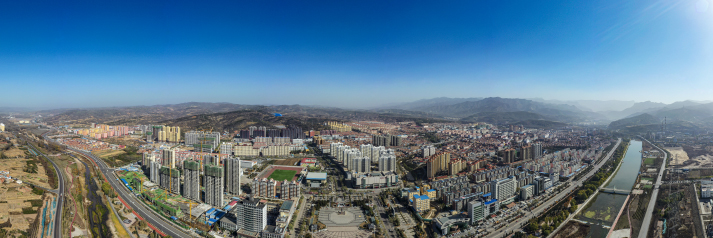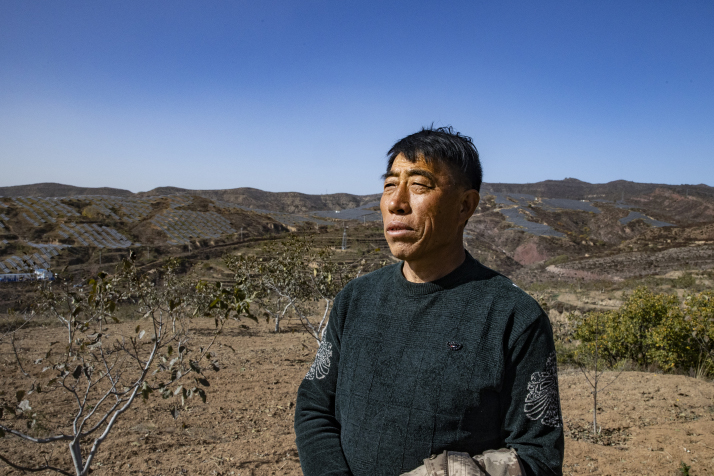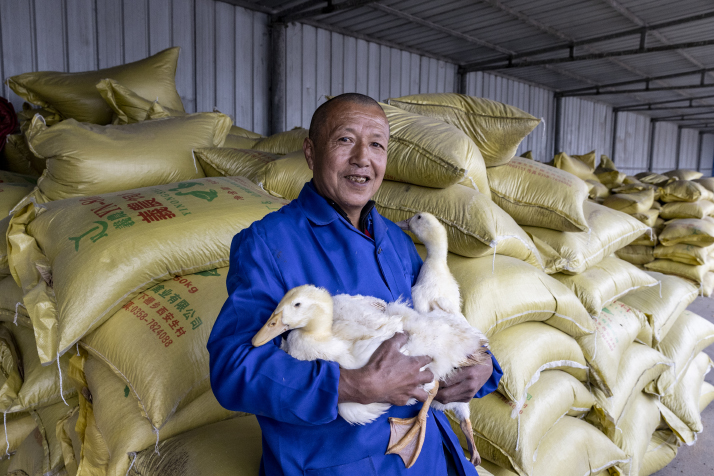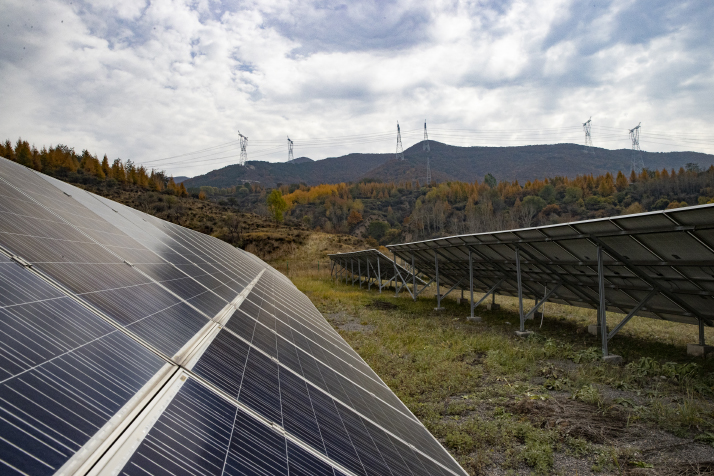|
||||||
|
||||||
| Home Nation World Business Opinion Lifestyle China Focus ChinAfrica Video Multimedia Columnists Documents Special Reports |
|
||||||
|
||||||
| Home Nation World Business Opinion Lifestyle China Focus ChinAfrica Video Multimedia Columnists Documents Special Reports |
| Editor's Choice |
| Old revolutionary base wins its battle on poverty with distinctive industries |
| By Ji Jing · 2020-11-06 · Source: NO.46 NOVEMBER 12, 2020 |
 A bird's-eye view of Zuoquan, a county in Shanxi Province in north China, on October 22 (CHEN JIAN)
The county of Zuoquan in Shanxi Province in north China has gone through two transformations in the recent century. Originally called Liaoxian, its name was changed to Zuoquan in 1942 to commemorate General Zuo Quan of the Eighth Route Army, who lost his life there that year in the War of Resistance Against Japanese Aggression (1931-45). The second transformation took place last year when the inland county, which had grappled with poverty for over two decades due to its limited natural resources, was officially declared poverty free. One reason for the poverty was the lack of arable land and growing wrong crops. Only 8 percent of the mountainous county is suitable for cultivation; the rest is largely covered by mountains and water. The farmers mostly planted corn since it was a traditional crop and they didn't want to experiment with new ones and take risks. But corn fetched little money and was also laborious. Back then, farmers did not realize that walnut, also a local product, had better prospects.  Guo Yinglin, Secretary of the Communist Party of China branch of Lianbi, a village in Zuoquan, on October 21 (CHEN JIAN)
Suited to the soil Zuoquan has a long history of walnut planting. The earliest walnut trees in the county grew in the wild more than 500 years ago. The high altitude and considerable difference between day and night temperatures result in walnuts with plump kernels, rich in protein, fat and oil. Also, they are thin shelled and easy to crack. Based on these considerations, eventually in 2012, the county authorities decided to develop Zuoquan as a walnut plantation base, growing varieties that would be hardy and drought-resistant. Of the 129 villages in the county registered as poor, Lianbi was the poorest, with no enterprises or mines. The mountains made it difficult to grow crops, nor could cattle be raised on the slopes as they had little vegetation. The young people in the village mostly went elsewhere to seek a living, with only the elderly remaining behind. In 2012, Guo Yinglin was the secretary of the Communist Party of China village branch. He decided to start walnut cultivation on the mountains. "There are only 120 hectares of arable land, but there are 1,000 hectares of mountains," he told the villagers. "We need to make good use of these mountains if we want to prosper." Providentially, a company had arrived in the village to prospect for natural gas and the money it paid as yearly rent, 340,000 yuan ($50,932), was used to buy walnut saplings and fertilizer. Then plantation on the mountains began. The drive inspired some of the elderly villagers. Guo Fulan, a farmer then in his 60s, decided to join in the work. "It's difficult for people of my age to find work," Guo Fulan said. "Since the village has found a new way of making a living, I want to be part of it too." The local government provided financial support to build roads in the mountains and the dogged perseverance finally resulted in a 200-hectare walnut plantation with around 81,000 trees. Today, the base pays over 500,000 yuan ($74,900) in total each year to over 100 individuals from Lianbi as well as neighboring villages. "In the past, I made very little money from growing corn and it was labor-intensive. Now I work at the walnut tree base and can make nearly 20,000 yuan ($2,996) a year," Guo Fulan said. "I don't need to bother with buying seeds and fertilizer or selling the nuts." Currently, the entire county has 24,000 hectares of walnut plantations with an annual output of 15 million kg, worth 300 million yuan ($45 million).  Liu Yanzhong, a villager in Lichang, Zuoquan, at the duck farm where he works, on October 20 (CHEN JIAN)
Emerging from seclusion In Lianbi, farmers are growing organic herbs and grains, which are sold both in Shanxi and other provinces and have helped over 400 households. Guo, the Party chief, said in the past it took at least two days to go to the nearest township, though it was only 10 km away, since there were no roads. Now with the new roads and transport, it takes only 10 minutes. With better roads, transport and penetration of mobile phones and the Internet, the once secluded village has opened up and also got to see the outside world. The technology-savvy farmers are selling their products such as millet online. Though the village stepped out of poverty in 2016, Guo, the Party chief, was still not satisfied. After the mountains were planted with walnut trees and grain crops, he came up with the idea of developing stable and sustainable industries. Zuoquan had applied for a photovoltaic (PV) project to develop the PV industry in impoverished villages as another targeted way of poverty alleviation. Lianbi also decided to develop a PV industry. In 2017, the Jiayao PV Power Generation Co. Ltd. decided to build a solar power station in the village. After construction was completed in October 2018, it was connected to solar panels in 96 villages. Last year, the station generated 50 million kilowatts.  Apple orchards use drip irrigation in Shangwu, a village in Zuoquan, on October 21. The irrigation system was funded by the China International Publishing Group (CHEN JIAN)
Besides the income from the rent paid by the company and the money paid to the owners of the solar panels, the project also generates jobs for villagers. They work as maintenance staff, clearing weeds in summer and sweeping snow in winter. The village earns nearly 1 million yuan ($149,800) a year from solar power generation. In 2019, its per-capita annual income rose to 9,600 yuan ($1,438). Dou Haobin, deputy general manager of the company, is a Lianbi man. After graduation, he had gone to work outside the village but on learning a solar power station was going to come up there, the mechanical and electrical engineering major decided to return home. He said it was the correct decision because he witnessed the transformation of his hometown thanks to the targeted poverty alleviation efforts and rural revitalization drive and feels more motivated in his work and life. Liu Aijun, who lives in Lichang, another village in Zuoquan, is also a beneficiary of the solar power project. He took a loan from the local rural credit cooperative, which was given to him interest free under a special poverty alleviation policy. Combining it with his savings, he installed solar panels on his house roof. They are connected to a power station and fetch him around 7,000 yuan ($1,049) a year. Liu said he will be able to pay off his loan by the end of the year. In the meantime, he has bought six cows with the money earned from his new venture and now has another income-generating business lined up. Song Xianglin, Director of the Lichang Villagers' Committee, said the money earned from the power station is used to improve village infrastructure. A daycare center has been built for the elderly, where people above 65 are provided with three free meals a day. Harnessing the sun There are three kinds of solar power stations in Zuoquan. One is built and operated by professional companies. There is only one such station in the county. The second type is power stations run by the village collective with the profits distributed among villages. There are over 30 such stations. The third is the rooftop solar panels whose profits go directly to the owners. As the local government allows arable and barren land, forests, collectively owned rural construction land and homesteads to be rented out to enterprises to develop industries, Lianbi is signing contracts with cooperatives. The Longxin Farmers' Cooperative both buys grain from farmers at a slightly higher price than the market rate and rents land and hires the farmers to grow crops for a salary.  Solar panels in Lichang Village, Zuoquan County (CHEN JIAN)
Cooperatives are part of a strategic campaign to improve farmers' incomes and the environment at the same time. In many villages they are involved in afforestation, hiring locals to plant trees. The planting is organized during the slack farming season when farmers used to be idle. Now they can work in this period to make more money. Such innovative contracts have seen the idle land in Lianbi and other villages fully utilized. When the trees and herbs are in flower, the once barren mountains come alive with colors. (Print Edition Title: Cracking a Tough Nut) Copyedited by Sudeshna Sarkar Comments to jijing@bjreview.com |
| About Us | Contact Us | Advertise with Us | Subscribe |
| Copyright Beijing Review All rights reserved 京ICP备08005356号 京公网安备110102005860号 |